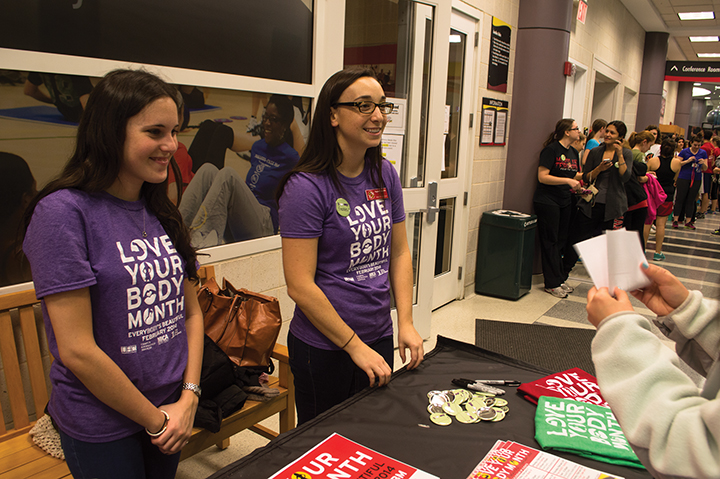
Lindsey Axel (left) and Meghan Cohen of the Health and Wellness Center, speak to a student at the Love Your Body Zumba event at Eppley Recreation Center on Friday, Feb. 7.
Inspired by uplifting lyrics in songs such as “Born This Way” by Lady Gaga and “Beautiful” by Christina Aguilera, students at Friday’s Zumba class in Eppley Recreation Center started a monthlong programming series to raise awareness about eating disorders and promote positive body images.
“Love Your Body Month,” organized by the University Health Center’s Wellness program, is an expansion of Eating Disorder Awareness Week, which falls on the last week of February this year.
“We decided to turn it into a monthlong series of events and spin it to be a little more of a positive focus,” said Meghan Cohen, health and wellness coordinator. “So instead of only bringing awareness to eating disorders, we also wanted to bring awareness to body image issues, especially things like the media’s effect on body image and just promote an overall positive message of loving your body and the different ways that you can do that.”
Events in this year’s Love Your Body Month are co-sponsored by Campus Recreation Services, Delta Phi Epsilon sorority, the Office of Multicultural Involvement & Community Advocacy, the One Project and the Student Health Advisory Committee.
By working with student groups on the campus, Cohen hopes the events for the fifth annual awareness month will bring big numbers. The events range from exercise classes at the ERC to a Body Image Open Mic night, free HIV testing at the Health Center and programs to encourage a healthy relationship with food.
“The events really are intentional. We want people to learn something from the events we are doing,” Cohen said. “The events in the ERC focus on the fitness aspect of loving your body and also to educate about the dangers of compulsive exercising.”
Outside of the Zumba class, Cohen, a Health and Wellness intern and HEALTH Works peer educators set up a table to reach passersby in the ERC. They handed out educational materials on eating disorders, overexercising and body image, passed out buttons with a blank to fill in what people love about their bodies and had blank Valentine’s Day cards for people to write to their bodies.
“This is a good kick-start event for the rest of the campaign that we have for the month,” said Lindsey Axel, Health and Wellness intern. “Eating disorders are about education and awareness. A lot of people equate it to being shameful or embarrassing to share if they think they have a problem or their friend has a problem. So if you are given the information, it gives them a leeway to a whole world of help that they didn’t know existed. It opens a lot of doors for them.”
Michelle Regius, an exercise class instructor since May 2012, embraced the Love Your Body Month message by planning a dance to “Born This Way” for the Zumba session she taught.
“I think it’s a great, beautiful message about everyone’s bodies,” Regius said. “I think we should be having it all year-round. I think it’s a great way to make your body feel great. I love dance fitness because you dance and have fun and enjoy your curves and feel beautiful.”
Sachi Khemka, a freshman business student, said she felt a special atmosphere during Zumba.
“Everyone was singing along,” said Khemka, who won a “Love Your Body” T-shirt. “Everyone was really energetic and really excited.”
Catherine Thompson, a HEALTH Works peer educator, had never taken a Zumba class until the event.
“It’s a good way to love your body while you’re working out,” said Thompson, a senior government and politics major. “Body image issues and eating disorders are a huge issue among college students, male and female, so I’m really glad University of Maryland is putting so much effort into encouraging positive body image.”
After the event, students flocked to the HEALTH Works table, giving the Love Your Body team a chance to spread their message.
“I think just gaining one piece of information is all you need,” Axel said. “Knowledge goes a long way, and the more knowledge you have, the more willing you are to try and make changes in your life or someone else’s.”
Cohen said she has many goals for the impact of the program during the rest of the month.
“The huge stereotype I wanted to focus on this year, that I want to try to break, is that eating disorders and body image issues are an affluent white woman’s problem,” Cohen said. “That’s the historical thought and stereotype, and it’s really not true. Eating disorders don’t discriminate. But mostly we want it to have an overall positive feel, so we want people to learn different ways that they can appreciate everything that their body does for them, and they can love how they look and how they feel in their body and to promote that message among their friends.”
This university’s large campus makes it hard to reach everyone, but Cohen and Axel agreed these events can have a large effect when people start talking.
“Ultimately, in a perfect world, if I could change the entire societal culture and how we view bodies and the messages that are being put out in the media about what an ideal body should look like, I would love to change that,” Cohen said. “But it starts with things like this — it starts with small shifts in individual thought processes, and then that spreads.”
CORRECTION: Due to an editing error, an earlier version of this story incorrectly identified Health and Wellness coordinator Meghan Cohen in one instance as an intern.



